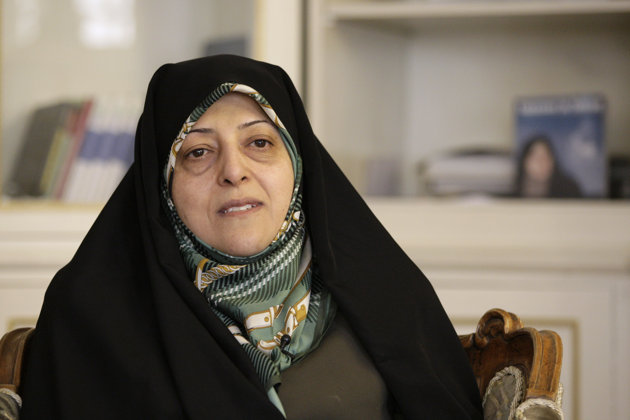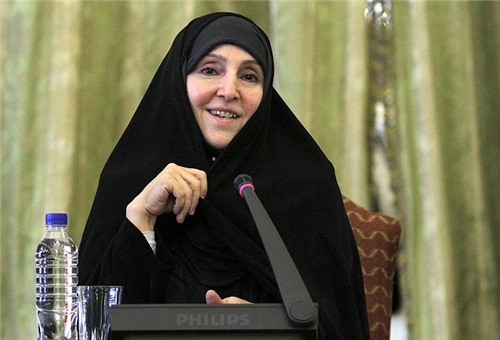
September 13-2013
President Rohani has named a second woman as a deputy president. Rohani brought back Masumeh Ebtekar, who was deputy president and head of the Environmental Protection Agency for eight years under President Khatami, to that same position.
Rohani has come under criticism from women supporters for failing to name any women to the cabinet and he seems to be scrambling to try to assuage that anger.
He earlier named a woman, Elham Aminzadeh, to be deputy president for legal affairs, an obscure position.

One reason for naming woman as deputy presidents is that those posts do not require Majlis approval. President Ahmadi-nejad nominated three women to his cabinet, but was able to get only one through the Majlis.
Some women suspect Rohani of being conservative on women’s issues, unlike Ahmadi-nejad who publicly denigrated the dress code, tried to remove the ban on women attending soccer games, and was photographed touching women on two occasions.
Ebtekar, the new environmental chief, is perhaps better known in the United States than in Iran. Three decades ago, she was “Mary,” the spokeswoman for the students who had seized the US embassy. She speaks fluent English as she grew up outside Philadelphia while her father was a graduate student in the United States.
When she was first named environmental chief in 1997, she tried to hide her link to the embassy takeover. She was outted a few years later when an American reporter who covered the hostage crisis recognized her.
The Rohani Administration has named another woman to one of the most visible—if not terribly important—positions in the government.
Marzieh Afkham has been named the spokesperson for the Foreign Ministry, guaranteeing that the Iranian people will see a woman speaking on behalf of the government frequently on the evening news.
The Foreign Ministry has also said it will be naming a woman soon to be an ambassador.
The new spokeswoman is a career Foreign Ministry employee. She has served the last eight years as the ministry’s director general for information and media. Under Foreign Minister Ali-Akbar Salehi, she was also director general for public diplomacy.
Elsewhere in the new administration, a considerable housecleaning is obvious.
Most importantly, Rohani has named a new Central Bank governor, Valiollah Seif, to replace the often-browbeaten Mahmud Bahmani. Bahmani was regularly at odds with the Ahmadi-nejad Administration and many were surprised he was not fired long ago as he fought a losing rear-guard battle to modify many Ahmadi-nejad policies.
Many economists in Tehran argue that more important than the man who occupies the governor’s seat is the issue of the Central Bank’s independence. In almost all major counties these days, the Central Bank is an independent institution whose decisions cannot be reviewed or reversed by the president or prime minister. In Iran, however, the Central Bank is subservient to the president. Rohani has not said whether he plans to change that.
The new Central Bank governor has been the seniormost official at several banks, both publicly- and privately-owned, including Banks Mellat, Saderat, Sepah, Melli and Karafarin.
In his early 60s, Seif will largely be judged by how he tackles inflation.
He has already said publicly that Iran’s interest rates ought not be lower than inflation. That is not a debatable point among economists and bankers. But President Ahmadi-nejad insisted on depressing interest rates to make borrowing easier. The main interest rate is now 21 percent while the inflation rate is bumping up toward 40 percent. Seif is expected to revise interest rates upward shortly.
He has also indicated he will not try to lower exchange rates, as most politicians wish him to do, but will try to keep the rial at around the current 32,000 to the dollar, which most economists think is the correct policy. “Right now the value of the dollar in the free market is 32,000 rials, and this is not an illogical rate,” Seif said after he was named governor.
He also warned the public not to expect dramatic changes in the economy “in a short amount of time.” He didn’t explain why, but most generally believe he sees himself as limited in what he can do by the impact of sanctions.
Rohani this week brought back Adm. Ali Shamkhani, who was defense minister for all eight years of the Khatami Administration, and named him to be secretary of the Supreme National Security Council, the post Rohani held throughout the Khatami Administration.
Shamkhani, 58, was born in Ahvaz to an Arab family. Since losing his cabinet post in 2005, he has been the chief of the Armed Forces Center for Strategic Studies.
Shamkhani will not, however, be handling the nuclear issue because Rohani turned that over to the Foreign Ministry last week. Foreign Minister Mohammad-Javad Zarif will decide whether he himself will be the negotiator or someone else. (Given that the Big Six countries send vice ministers to the nuclear talks, it is considered unlikely Zarif himself will attend.)
Rohani also named a new ambassador to the International Atomic Energy Agency. Reza Najafi is a career Foreign Ministry staffer. His previous positions have included taskings related to disarmament, chemical weapons prevention and nuclear non-proliferation. There did not appear to be any displeasure with the outgoing ambassador, Ali-Asghar Soltanieh. But Rohani seems interested in bringing in an entirely new team to deal with the nuclear issue, so no one will be burdened by anything they had to say during the Ahmadi-nejad years,
Oil Minister Bijan Namdar-Zanganeh has fired Mohammad-Ali Khatibi from his post as director for international affairs and replaced him with Mohsen Qamsari, who held that post until he was fired a year ago.
Rohani has chosen Akbar Torkan, a former cabinet minister, to head a new presidential council of advisers. Torkan was defense minister in President Rafsanjani’s first term and transport minister in the second term. Presidents in Iran have commonly named all sorts of advisers with many of those posts appearing to be sinecures when the men left other posts. Rohani appears to want to use the advisers as a brain trust—something that may challenge the turf of the cabinet ministers. Torkan is close to Rohani and was his deputy campaign manager. He immediately started speaking out on administration policy, indicating his job is no sinecure.
